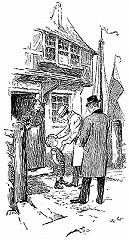“WHAT now?” I asked. “Toby has lost his character for infallibility.”
“He acted according to his lights,” said Holmes, lifting him down from the barrel and walking him out of the timber-yard. “If you consider how much creosote is carted about London in one day, it is no great wonder that our trail should have been crossed. It is much used now, especially for the seasoning of wood. Poor Toby is not to blame.”
“We must get on the main scent again, I suppose.”
“Yes. And, fortunately, we have no distance to go. Evidently what puzzled the dog at the corner of Knight’s Place was that there were two different trails running in opposite directions. We took the wrong one. It only remains to follow the other.”
There was no difficulty about this. On leading Toby to the place where he had committed his fault, he cast about in a wide circle and finally dashed off in a fresh direction.
“We must take care that he does not now bring us to the place where the creosote-barrel came from,” I observed.
“I had thought of that. But you notice that he keeps on the pavement, whereas the barrel passed down the roadway. No, we are on the true scent now.”
It tended down towards the riverside, running through Belmont Place and Prince’s Street. At the end of Broad Street it ran right down to the water’s edge, where there was a small wooden wharf. Toby led us to the very edge of this and there stood whining, looking out on the dark current beyond.
“We are out of luck,” said Holmes. “They have taken to a boat here.”
Several small punts and skiffs were lying about in the water and on the edge of the wharf. We took Toby round to each in turn, but though he sniffed earnestly he made no sign.
Close to the rude landing-stage was a small brick house, with a wooden placard slung out through the second window. “Mordecai Smith” was printed across it in large letters, and, underneath, “Boats to hire by the hour or day.” A second inscription above the door informed us that a steam launch was kept - a statement which was confirmed by a great pile of coke upon the jetty. Sherlock Holmes looked slowly round, and his face assumed an ominous expression.
“This looks bad,” said he. “These fellows are sharper than I expected. They seem to have covered their tracks. There has, I fear, been preconcerted management here.”
He was approaching the door of the house, when it opened, and a little curly-headed lad of six came running out, followed by a stoutish, red-faced woman with a large sponge in her hand.
“You come back and be washed, Jack,” she shouted. “Come back, you young imp; for if your father comes home and finds you like that he’ll let us hear of it.”

“Dear little chap!” said Holmes strategically. “What a rosy-cheeked young rascal! Now, Jack, is there anything you would like?”
The youth pondered for a moment.
“I’d like a shillin’,” said he.
“Nothing you would like better?”
“I’d like two shillin’ better,” the prodigy answered after some thought.
“Here you are, then! Catch! - A fine child, Mrs. Smith!”
“Lor’ bless you, sir, he is that, and forward. He gets a’most too much for me to manage, ’ specially when my man is away days at a time.”
“Away, is he?” said Holmes in a disappointed voice. “I am sorry for that, for I wanted to speak to Mr. Smith.”
“He’s been away since yesterday mornin’, sir, and, truth to tell, I am beginnin’ to feel frightened about him. But if it was about a boat, sir, maybe I could serve as well.”
“I wanted to hire his steam launch.”